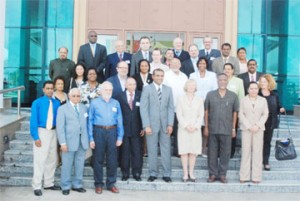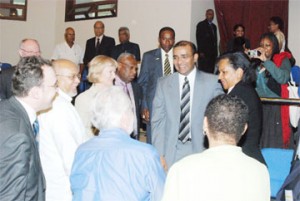-EU-ACP Assembly opens
President Bharrat Jagdeo says that protectionist measures emerging in developed countries following the global financial crisis are of “major concern” to ACP countries that have signed the Econo-mic Partnership Agreement (EPA) with the European Union based on reciprocal trade.
And in the current economic climate, he said, the implementation of the EPA could be reconsidered because of the major economic powers that “cannot handle open trade.”
Jagdeo, who had been strongly opposed to the EPA, declared that countries which had been robust advocates of free trade and reciprocity have since moved to protect their economies at the first sign of trouble.

Jagdeo asked yesterday “… what will reciprocity in the EPA mean for us then?” and received resounding support during the 3rd Regional Meeting of the ACP-EU Joint Parliamentary Assembly, Caribbean Region that opened at the Guyana International Conference Centre.
“I was tempted to call for a moratorium of the EPA implementation until the financial crisis settles,” Jagdeo said, noting that he feels it is time for those involved to re-think the ‘whole thing’.
Jagdeo reaffirmed his position that the relationship between the EU and the ACP countries which ought to be based on trust was not on this basis at the time of the EPA negotiations, adding that there is a breakdown of trust. He reiterated that many of the issues in the Cotonou Agreement such as negotiating in good faith and trust had been ignored.
The Head of State pointed to the threats Guyana faced prior to signing the agreement saying “you don’t build partnerships by starting off with threats,” and he called upon the ACP countries to be a little less trusting in future relations. According to him, it is an unfortunate position to take but an important one.
Jagdeo’s sharp comments came during his feature address delivered at the opening session of the regional assembly, which kicked off on a serious note that underscored the increasing economic challenges facing ACP countries, particularly in agricultural sectors that are heavily dependent on trading preferences.
The region’s sugar, bananas and rum which are facing the erosion of critical preferential treatment were raised as key subjects of discussion for the two-day assembly given the relentless pursuit of Latin American countries of tariff-free access for similar products to EU markets.

Jagdeo spoke to this issue saying that the region’s agricultural products “need protection” even though the EU is saying that it needs none, and he cited the case of France recently moving to protect the bananas and sugar on its French overseas territory of Guadeloupe.
Further, he asserted that the larger economies across the globe are catering for their interests while the majority of other countries wake up to learn that their interests are not being represented.
According to Jagdeo, the EU has consistently called on developing countries such as those in the ACP region to diversify their economies when there are no institutional structures in place to promote diversification. He said too, the EU keeps making “these cliché kinds of suggestions” knowing that we have limited options, narrow economic base, structural problems and limited coping mechanisms.
Economic blows
Co-President of the ACP-EU Joint Parliamentary Assembly, Glenys Kinnock yesterday emphasised that developmental assistance and aid packages will decline over the next few years, but more importantly she said that the region has to cope with the slowdown in investments; decline in tourism and fall in remittances, among other economic blows.
She opined that the G22 should listen to the voices of the developing world “which they didn’t at their last meeting” and suggested that the G22 should call for a development emergency in 2009, and accelerate the disbursement of accrued funds [to economies in need].
Kinnock said the region’s banana producers who struggle all day continue to face attacks from Latin America, adding that the EU is now set on gradually cutting the tariffs on “their bananas which is shocking now as when I first looked at these issues.”
Kinnock was referring to the Chiquita banana trade issue involving the US some fifteen years ago.
The ACP-EU Co-President said she understands the importance of sugar and bananas to the region, and recalled when she visited Guyana in 2005 and a cane cutter remarked that “sugar means everything, it is my life” in response to her question about his work.
Kinnock said that the region now faces the imminent threat of an EU trade agreement with Central America, noting that any EU grant to Central America allowing free access to their markets for sugar, banana and rum will mean a significant erosion of the value of regional products.
She said too that this may set a precedent for similar negotiations that will take place with the Andean and MERCOSUR nations as well as bi-laterals with Peru and Colombia “all of which are able to produce at a lower cost almost anything that nations in this region can grow or manufacture.”
Further, she said that there is no requirement for the EU to consult with the Caribbean when it negotiates in areas likely to affect the region in spite of the wording in the EPA on the protection of sensitive products. However, she said that the decision taken by CARIFORUM should be respected and supported in positive and constructive ways. Kinnock added that the EU must offer flexibility and support all efforts to ensure that benefits can flow from the agreement.
She charged that parliamentarians must be energetic and directly involved in the process, noting that so far that has not been the case. Kinnock said further that the scrutiny of parliamentarians is an essential element in the efforts that are being made to review and monitor the implementation of the EPA.
Kinnock lauded Jagdeo for his leadership on the issue of environmental security ahead of the critical Copenhagen meeting on climate change next month while pointing to the importance of setting environmental issues on the parliamentary agenda.
Jagdeo also called on the parliamentarians to incorporate the issue of climate change into the discussions because “the environment is now of economic importance.”
The joint parliamentary assembly will also deliberate on other serious issues affecting the region, including the global financial crisis; increases in organized crime; transshipment of weapons; narcotics production and human trafficking.
Speaker of the National Assembly, Ralph Ramkarran emphasized the need for the joint assembly to set a plan in motion to avert disruption of regional development. He called for Guyana’s position on the EPA to be given full consideration when the assembly is preparing its draft paper.





